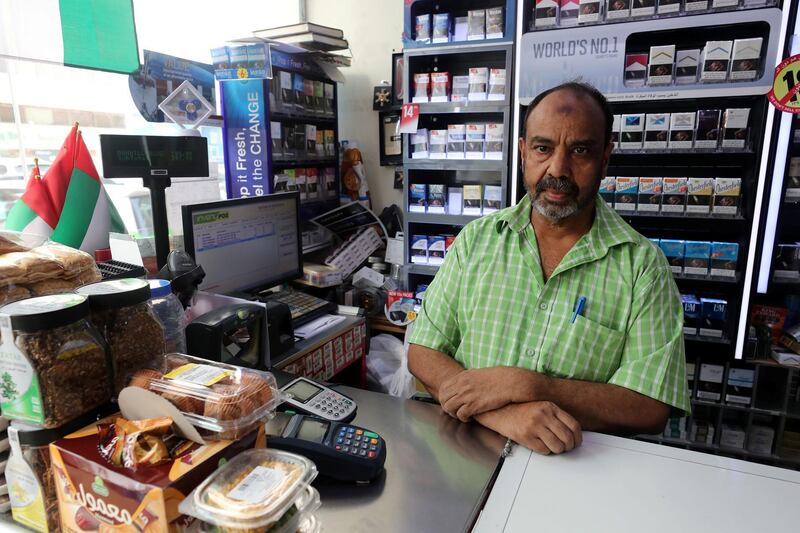Abu Dhabi’s corner shops are bracing for the impact of VAT on January 1.
Many expect an initial slowdown in business when the 5 per cent value added tax is applied.
At one Baqala shop in the Al Nayhan neighbourhood, manager Mohammed Shameam predicted that it would definitely have a knock-on effect. He pointed to the impact of the doubling of cigarette prices and the 50 per cent increase in sugary soft drinks applied in September.
All retailers, including the many smaller shops dotted around the city's corners, side streets and neighbourhoods must display prices inclusive of VAT from Monday.
“Cigarette sales [of certain brands] have gone down – maybe by about 30 per cent. It’s the same with energy drinks. All sales went down," said Mr Shameam.
"Before people would buy two or three energy drinks and one pack of cigarettes every day but now it’s one drink. And the cigarettes are a cheaper brand."
Customers have been into the shop asking about VAT over the past few weeks. But Mr Shameam said he was prepared and that he wouldn’t be surprised if there was a big rush of people buying items ahead of the deadline.
All the shops visited by The National on Wednesday had registered for VAT, had or were in the process of updating their scanning systems and would start to label items by hand with the new prices over the weekend.
Down the road at another baqala, manager Abdul Gaffrr said he expected the VAT introduction to potentially hit low-income workers.Mr Gaffrr, from Kerala, has been a UAE resident of more than 20 years. “It might have an impact on lower income workers as salaries for them are not increasing. But many other people are just waiting to see regarding VAT.
“Business has come down, especially sales of cigarettes [of certain brands] which are down by 30 per cent (since the introduction of excise tax)," he said.
The Government introduced the tax on cigarettes and fizzy drinks to curb the rising prevalence of diseases such as diabetes, relieve pressure on the health service and boost revenues.
The introduction of VAT is expected to further boost revenues by as much as Dh12 billion in the first year as the Government seeks to diversify from oil and gas.
VAT will come into force at 7am on January 1. Currently school fees, healthcare, rent and public transportation are exempt from the tax. However, some analysts predict the introduction of VAT could hike the average cost of living by between 1.5 and 2 per cent.
Abu Dhabi’s much-loved corner shops have had a front row seat to the dizzying evolution of the city. In 2013, many underwent an expensive makeover. New regulations set down by the municipality saw most rebranded as “baqalas” with better lighting, wider aisles and more efficient refrigerators and freezers. It brought an end to the old-style shops that had been around for decades, many closed down and long-serving staff left the country. They’ve also seen the introduction of the cigarette and drink tax and are now witnesses to the landmark move by the UAE to introduce VAT.
One shop manager, who did not wish to be named, said it was impossible to predict what would happen after January 1. "We will have to wait for a year to assess the impact. But people on lower salaries will probably be hit."
At the Suhaila Supermarket close to the Russian embassy off Khalifa Street, manager Mohammed Jamal predicts VAT could impact sales for the first month or two.
“People have to eat. People will adapt. Someone who now eats a chicken burger might switch to something cheaper. But they are still eating every day,” said Mr Jamal, who has lived in the UAE for more than 25 years. He seemed sanguine about the effect of people buying cheaper goods or less goods on his business.
“Before, people bought cola but now they buy juice or laban which is cheaper. But they will still buy drinks. People switched to cheaper cigarette brands when that charge came in,” said Mr Jamal, who is from India.
“But I’m not sure how it will affect everyone. It might affect people on lower incomes more because salaries have stayed the same for them.”
“But this new tax is good for the country generally.”
_______________________
Read more:
[ UAE petrol price rise for New Year inclusive of VAT ]
[ Dubai retailers fined for adding VAT to prices ahead of roll-out ]







